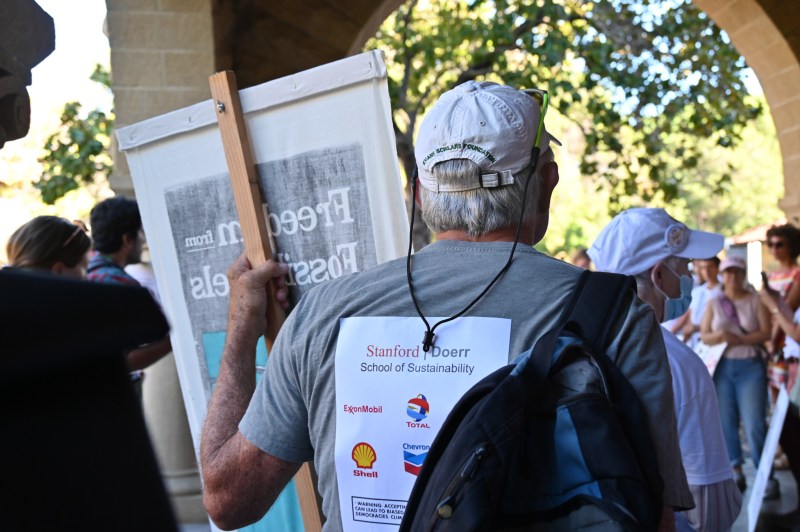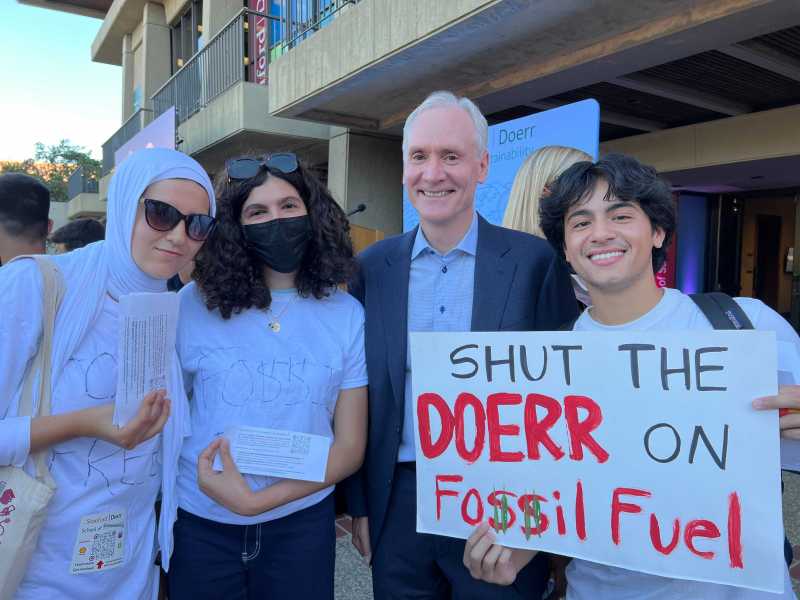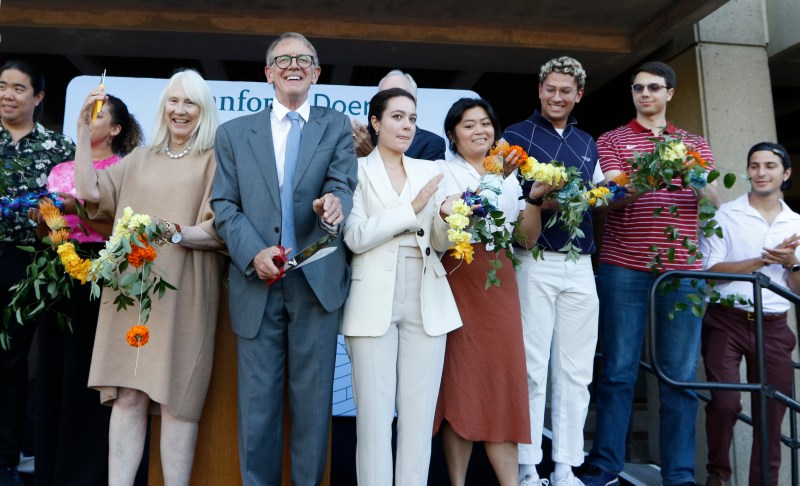Protesters interrupted the Doerr School of Sustainability’s opening ceremony Thursday advocating against fossil fuel funding for the new school. The event to celebrate the school’s recent opening on the first of this month drew big names including Tom Steyer, a billionaire who centered climate change in his 2020 presidential campaign.
The protest, organized by Stanford Coalition for a True School of Sustainability and comprised of students and faculty, marks the latest in a series of community advocacy events after news broke that the sustainability school will continue receiving research funding from oil and gas companies. The coalition called on Stanford to decline future funding from such companies and create public sustainability standards that funders would need to meet.
“We can’t wholeheartedly celebrate the launch of this school as long as these funding ties to the fossil fuel industry exist,” June Choi, a second-year earth system science Ph.D. student, said in an interview.
The protestors organized at the Braun Geology Corner and moved to the Mitchell Earth Sciences building where the opening ceremony was held. Protesters held signs that read “Freedom from Fossil Fuels” and “Shut the Doerr on Fossil Fuels.” They chanted “Hey hey, ho ho, fossil funding has got to go!” and “Big oil no more, fossil fuels out the door” at the base of the building.

Comparative literature professor David Palumbo-Liu spoke at the demonstration, arguing that Stanford has a responsibility to refuse funding from companies that continue to extract, process and sell fossil fuels.
“By accepting dirty money, Stanford is abdicating its responsibility as a research institution,” Palumbo-Liu told the crowd.
Criticism of the new school began in early May, when its inaugural Dean Arun Majumdar told The New York Times that the school would accept funding from fossil fuel companies under his leadership.
Majumdar has since clarified his stance on fossil fuel funding. While the school will accept funding for industry-affiliated programs such as the Bitts & Watts Initiative or StorageX, he wrote in a May public letter, “the School does not have plans to seek funding from oil and gas companies for its general operations.”
The coalition has publicized a breakdown of fossil fuel funding in the sustainability school on their website, published letters to the community making their case and organized events like Thursday’s protest to raise awareness.
Once the opening ceremony began the protestors returned to the Geology corner and gave space for the event speakers. Sustainability school Dean Arun Majumdar, University President Marc Tessier-Lavigne, Knight-Hennessy scholar Anela Arifi and John Doerr spoke at the ceremony. Investor and venture capitalist Doerr, for whom the school is named, donated $1.1 billion in support of its establishment.

Majumdar, the first to speak, acknowledged the protest before his speech: “To the students out there, we hear you, we hear you loud and clear.”
Majumdar told The Daily after the event that he has begun a listening tour to meet with students and faculty regarding the sustainability school. “Hopefully, it’ll get done by the end of this quarter,” Majumdar added. Afterward, he said, he plans to publish a transparent report and address disputed issues moving forward.
In her remarks, Arifi, a passionate global environmental justice advocate who grew up witnessing energy poverty in Bosnia, praised Stanford’s interdisciplinary focus for how it has enabled her Ph.D. research in biofuels for aviation and policy.
Arifi’s speech was partly interrupted by the protestors, who resumed their chants prematurely. After the interruption, she said that for the sustainability school to fulfill its promise it must partner “with entities who are fully aligned with Stanford’s vision for slashing emissions and refuse funding from all those entities that undermine this big question.”
Doerr, who gave the final speech, concluded the opening ceremony with optimism.
“Climate change is one of the greatest opportunities ever presented to mankind,” he said. “Climate science could become the new computer science.”

Some attendees of the opening ceremony said they saw benefits in the school accepting fossil fuel money.
“If anyone’s going to make the change fast enough, it’s going to be with the help of these companies,” said Omar Rosales-Cortez, a second-year geological sciences Ph.D. student, who added that he acknowledges the industry’s historic contribution to climate change.
Earth systems professor Noah Diffenbaugh, who said he does not receive funding from fossil fuel companies, told The Daily that he believes in Stanford’s commitment to its Openness in Research Policy, which promotes academic freedom and transparency in research.
“Stanford has been extremely supportive of me as a [principal investigator] in declaring the sources of funding,” Diffenbaugh said, adding that he has been able to disclose funding even when the federal funding agency did not want that information made public.

Among those in attendance at the high-profile event was Tom Steyer. Steyer led philanthropic efforts in sustainability, founded Stanford’s TomKat Center for Sustainable Energy and the Steyer-Taylor Center for Energy Policy and Finance, and ran for president in 2020. He also served on the University’s Board of Trustees from 2007 to 2017.
“The more conversation and the more interaction there is between members of the Stanford community to structure this school in the way that is best for Stanford, I am entirely supportive of. These are highly idealistic people trying to do the right thing and caring a lot,” he told The Daily. “Who doesn’t respect that?”
A previous version of this article misspelled Anela Arifi’s last name. The Daily regrets this error.
